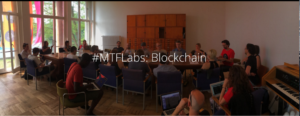This week, MusicTechFest released their first Blockchain Whitepaper. It was created during the may 2016 MTF-event in Berlin (to which I was invited, but could not attend).
It is a fun read, and mostly accurate (Satoshi’s Bitcoin Whitepaper was released in 2008, not 2010, for instance). The discussions of possibilities for technical implementations of Blockchain technology are fortunetely limited:
“Simply starting from a technical perspective and inventing solutions in search of problems would not have provided the foundational work achieved in the lab.”
Also, much to its credit, the whitepaper addressed that most basic challenge for all of today’s complex systems: complexity, obfuscation and opaqueness of the current solutions:
“Fortunately, some interesting resolutions emerge – ideas that met at a strange crossroads of the blockchain’s inherent limitations and struggles to get an industry that is used to operating in a an opaque environment to transition to total openness.”
Most importantly, the authors of the Whitepaper show to understand the magnitude of complexity, and the inevitable conclusion to which that insight must lead:
“Although, as noted, there was nothing resembling a complete consensus, the very divisiveness seemed to indicate that trying to make a one-size-fits-all complete solution would be a project doomed to fail.”
Only a common enemy unites all stakeholders
Most interesting part of this Whitepaper, to me, is where it discusses the road forward. Having mapped out all stakeholders, the Whitepaper plausibly argues that:
“Each of the stakeholder groups have varying levels of attraction and impediments for adopting a blockchain solution, but even within the categories we identify, differences in opinion are legion.”
When confronted with a large array of stakeholders, that hold competing views on how data needs to be handled, let alone business models that do not suffer change lightly, it helps to take the view, described as ‘Chain Computerization‘. The only way to bring all stakeholders together in any worthwhile effort is to identify the Dominant Chain Problem. Meaning: which problem touches every stakeholder in a way that they are willing to put in the effort to come to a solution that benefits the entire chain?
Enter Conflict Resolution. The common enemy that might unite all stakeholders.
“One key aspect that the result of our discussions was on the topic of conflict resolution – that is, how should the (single, global) system handle if multiple parties claim ownership on a single piece of data?”
And before you think: you will never manage to build a system that resolves the conflicts that arise from this, read along:
“Our conclusion is simple: the system, if it is decentralised through, for example, a blockchain, need not concern itself with resolution as long as it is clear to all users that the conflict exists. That is, searching the system for information concerning a piece of music would return all the relevant assertions made against it. Once the conflict is made visible, it is far more likely that the rights holder (or equivalent) will take further action outside of the system, getting the opposing party to withdraw their assertion of ownership, whether through direct communication or legal action or some other form of conflict resolution.”
I am curious to see if and what comes of this effort. If possible, I’d like to contribute.
